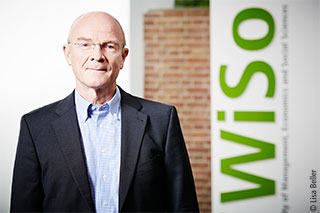ELECTRONICS AND ICT AS ENABLER FOR DIGITAL INDUSTRY AND OPTIMIZED SUPPLY CHAIN MANAGEMENT COVERING THE ENTIRE PRODUCT LIFECYCLE
The chair of Supply Chain Management and Production has embarked upon a new research and innovation project, co-funded by the European Union, ECSEL Joint Undertaking and National Funding Authorities from 19 involved countries. The lighthouse project “Productive 4.0” strives to digitalize the industry through new optimization models, improved processes and concepts for optimizing manufacturing and supply networks. The industry of Information and Communication Technologies (ICT) as well as semiconductor manufacturing are the focal point. The project aims to spread the knowledge to other industrial sectors, thus serving as an inspiration for upcoming research in the field of “Industry 4.0”.
Project participants and budget
Within this project companies such as Bosch, Infineon Technologies, Philips and BMW are involved. On the academic side, the engaged institutions are, among others, the Karlsruhe Institute of Technology, Politecnico di Milano and the University of Cologne. The total budget amounts to over 106 Mio €. Productive 4.0 is split into ten different work packages.
Topic spectrum and objectives
The topics are ranging from standardization over Internet of Things to Automation & Digitization. Our chair is involved in both work-packages 4, “Process Virtualization” and 5, “Management of Digital Production Planning, Supply Chain Networks and Product Lifecycle”, with Prof. Horst Tempelmeier leading the latter in close collaboration with Bosch. These work packages aim to create a “digital twin” by linking the real with the digital world. Additionally, analytical performance evaluation models as well as optimization models will support smarter and more flexible production. As a result, a tool box will be created that enables fast and reliable decision making under real world circumstances which are subject to random influences on different levels.
Research focus
Our research will be focused on the complex semiconductor manufacturing process, based on the use case of the Bosch semiconductor plant in Reutlingen. After defining a hierarchical planning system, the focus will be on system design, operational planning, including an approach for master planning to coordinate stochastic dynamic demand and production, as well as scheduling and control policies. Finally, a performance assessment and optimization will be carried out using standard methods, algorithms and tools, including software development. The project will consequently involve the complete planning spectrum, ranging from dispatching of operations for single machines to long-term investment decisions.
The project is set to last three years, finalizing in April 2020.
